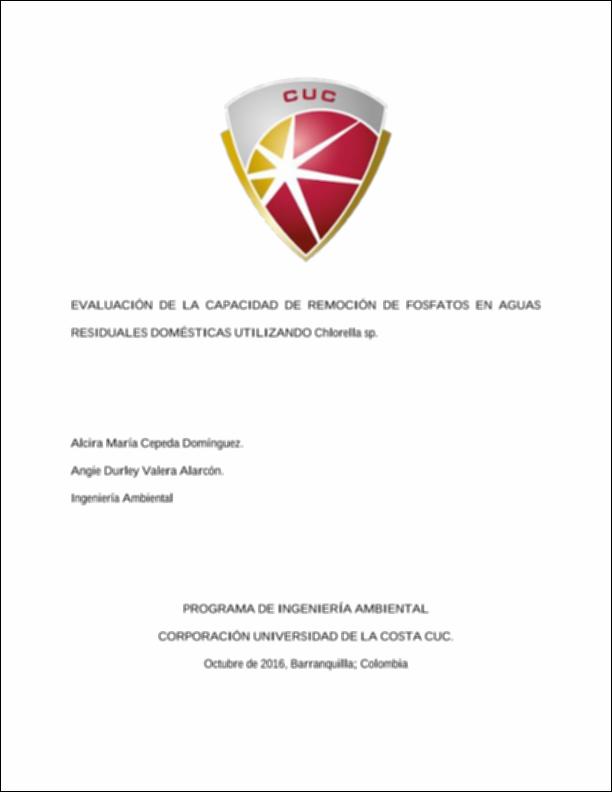Evaluación de la capacidad de remoción de fosfatos en aguas residuales domésticas utilizando chlorella sp
Trabajo de grado - Pregrado
2016-11-23
Ingeniería Ambiental
Uno de los fenómenos que se presenta con mayor regularidad y que contribuye en gran medida al deterioro de la calidad del agua es la eutrofización, propiciado por el aumento de nutrientes en los cuerpos de agua, entre los que se destaca el fósforo.
El principal objetivo de este trabajo ha sido evaluar la capacidad de remoción de fosfato en aguas residuales domésticas utilizando un cultivo de Chlorella sp., como alternativa para facilitar la eficiencia y sostenibilidad de los procesos convencionales de depuración de aguas residuales empleados en la actualidad por empresas de servicio público a nivel local.
Este estudio se ha enmarcado en una investigación de tipo experimental en condiciones semicontroladas de laboratorio; evaluando como variables de respuesta la concentración celular, pigmentos cloroplásticos, pH y concentraciones de fosfato en dos experimentos de prueba simultáneos i) Agua residual filtrada y microalga; comparados con ii) un tratamiento control con únicamente agua residual filtrada, cada uno con su respectiva réplica, por un período de 15 días.
Los resultados de la investigación evidenciaron que Chlorella sp responde favorablemente a las condiciones que provee el Agua Residual Filtrada y que la cepa tiene el potencial para remover el fosfato de las aguas residuales domésticas, teniendo en cuenta que se obtuvo una disminución de los niveles de concentración del ion fosfato en Agua Residual Filtrada, pasando de unos 57,6±1,8 mg/L al inicio del ensayo, hasta 17,2±1,3 mg/L en la fase exponencial, con un porcentaje de remoción de hasta el 61%. One of the phenomena that occurs more regularly and that contributes to a great extent to the deterioration of the quality of the water is the eutrophication, propitiated by the increase of nutrients in the water, among which the phosphorus stands out.
The main objective of this work was to evaluate the capacity of phosphate removal in domestic wastewater using a Chlorella sp. culture, as an alternative to facilitate the efficiency and sustainability of conventional wastewater treatment processes currently employed by companies of public service at the local level.
This study was framed in experimental research in semicontrolled laboratory conditions; evaluating the cellular concentration, chloroplastic pigments, pH and phosphate concentrations in two simultaneous test experiments as the response variables i) Filtered wastewater and microalga; compared to (ii) a control treatment with only filtered wastewater, each with its respective replicate, for a period of 15 days.
The results of the investigation showed that Chlorella sp. responds favorably to the conditions provided by the filtered wastewater and that the strain has the potential to remove the phosphate from domestic wastewater, taking into account that a decrease in concentration levels of phosphate ion in filtered wastewater was obtained, rising from about 57,6±1,8 mg/L at the start of the test, to 17,2±1,3 mg/L in the exponential phase, with a removal percentage up to 61%.
- Pregrado [1283]
Descripción:
1045729512 - 1140867566.pdf
Título: 1045729512 - 1140867566.pdf
Tamaño: 1.656Mb
 PDF
PDF
 LEER EN FLIP
LEER EN FLIP
Título: 1045729512 - 1140867566.pdf
Tamaño: 1.656Mb
 PDF
PDF
 LEER EN FLIP
LEER EN FLIP








